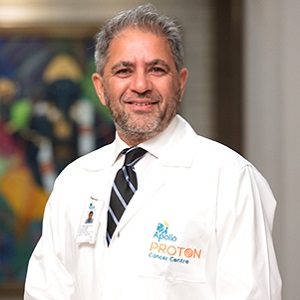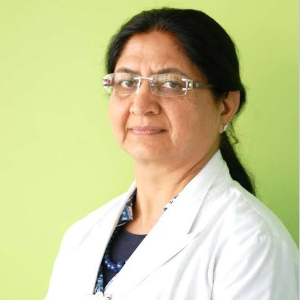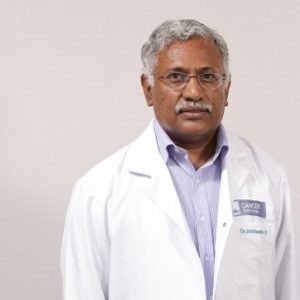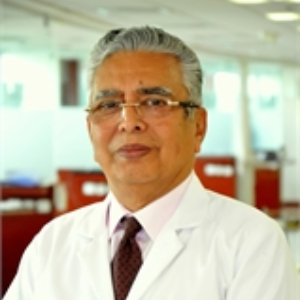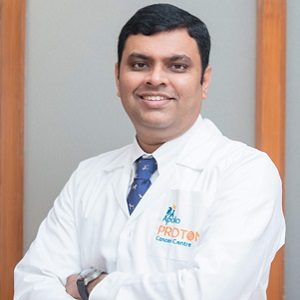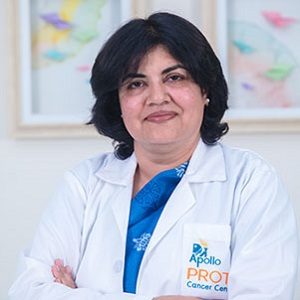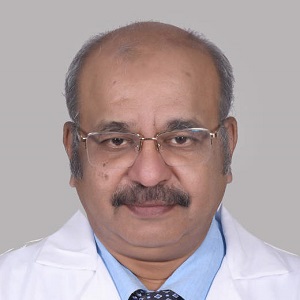Best Doctors in India for IMRT
- Radiation Oncologist, Chennai, India
- Over 20 years’ experience
Profile Highlights:
- Dr. Rakesh Jalali has been one of the top Radiation Oncologists in the country due to his utter dedication to Cancer Research and Education.
- He has been awarded the Oncologist Award by Medscape in 2014 and also received the top radiation oncologist award for consecutive 3 years from 2014 onwards.
- Over the years of his career, he has conducted path-breaking research to enhance the quality of cancer treatment.
- Radiation Oncologist, Gurugram, India
- Over 32 years’ experience
Profile Highlights:
- Dr. Tejinder Kataria is a renowned radiation oncologist who holds an experience of about 32 years in the field of radiation oncology.
- She founded the Department of Radiation Oncology at Artemis Health Institute and Rajiv Gandhi Cancer Institute.
- Her interests lie in stereotactic radiotherapy (SBRT), Image-Guided Radiotherapy (IGRT), Intensity Modulated Radiotherapy (IMRT)and 3-D Conformal Radiation (3D CRT), PET-CT, MRI, SPECT, DSA and CT-Simulator fusion for treatment planning.
- Radiation Oncologist, Chennai, India
- Over 25 years’ experience
Profile Highlights:
- Dr. Mahadev P is a radiation oncologist with 25+ years of experience and has played a major role in starting the Diplomate of National Board course in Radiotherapy in 2005.
- After getting trained in Australia, Dr. Mahadev P started Prostate brachytherapy at Apollo Specialty Cancer Hospital.
- Dr. Mahadev is also trained in Cyberknife radiosurgery – the only system in the world to treat tumors in the body with sub-millimeter accuracy.
- Radiation Oncologist, Gurugram, India
- Over 40 years’ experience
Profile Highlights:
- Dr. Subodh Chandra Pande is a well-known radiation oncologist in India. He has a long and rich clinical and teaching experience in the specialty of radiation oncology.
- He included a Dual Energy Linear Accelerator with Multi-Leaf Collimator at Bhagwan Mahaveer Cancer Hospital and Research Centre (BMCHRC), Jaipur & which was a first for the State of Rajasthan.
- Radiation Oncologist, Chennai, India
- Over 24 years’ experience
Profile Highlights:
- Dr. Rathna Devi is a senior Radiation Oncologist who has an experience of 24 years in the field.
- She completed MBBS from M.S. Ramaiah Medical College, Bangalore University, and a Diploma in Radiotherapy from Madras Medical College, Dr. MGR Medical University.
- Dr. Rathna Devi’s areas of expertise include Cranial Cyberknife Radiosurgery, Intensity Modulated Radiotherapy (IMRT), and Stereotactic Body Radio Therapy (SBRT).
- Radiation Oncologist, Chennai, India
- Over 15 years’ experience
Profile Highlights:
- Dr. Srinivas Chilukuri has been in one of the top layers of Oncologists in the country.
- He has been the clinical lead in advanced Radiation Oncology and has successfully trained more than 200 students all over the Indian Subcontinent.
- He was one of the first radiation oncologists to develop expertise and experience in the Volumetric Modulated technique for Paediatric and Prostate Cancer.
- Radiation Oncologist, Chennai, India
- Over 10 years’ experience
Profile Highlights:
- Dr. Ashwathy Susan Mathew has been an eminent doctor hailing from the Department of Radiation Oncology Apollo Proton Cancer Centre, Chennai.
- She has performed extensive research in the diagnosis and treatment of Gastro-Intestinal Cancers and related metastasis.
- She has been awarded the Parvati Devi Gold Medal for Best Paper at the 34th Annual Conference of the Association of Radiation Oncologists of India.
- Radiation Oncologist, Chennai, India
- Over 33 years’ experience
Profile Highlights:
- Dr. Sapna Nangia is a highly proficient clinical and radiation oncologist with versatile experience in cancer management.
- She has an experience of more than thirty-three years as a doctor and twenty-four years as a doctor across various eminent institutions in the country.
- Dr. Sapna Nangia has been trained for proton therapy at Miami Cancer Care, New York
- Radiation Oncologist, New Delhi, India
- Over 20 years’ experience
Profile Highlights:
- Dr. G K Jadhav is one of the leading radiation oncologists in India.
- He has a complex understanding of cancer biology, clinical care, and radiation physics.
- Dr. Jadhav has an experience of more than 20 years in the field of radiation oncology.
- Radiation Oncologist, Gurugram, India
- Over 20 years’ experience
Profile Highlights:
- Dr. Indu Bansal Agarwal is the Director and Senior Consultant in the Department of Radiation Oncology at Narayana Superspeciality Hospital, Gurugram.
- Dr. Indu Bansal Agarwal is extremely skilled in high-end techniques such as SRS, FSRS, IMRT, intraluminal, and interstitial brachytherapy. Her special areas of interest are Pediatric tumors, Central Nervous System Tumors, and Breast, Head and Neck Cancers.
- Dr. Indu Agarwal has co-authored chapters of several books and also has numerous publications to her credit in National and International Journals.
Best Hospitals in India for IMRT
Indraprastha Apollo Hospital, New Delhi
- City: New Delhi, India
Hospital Highlights:
- Indraprastha Apollo Hospital is a 700-bedded multispecialty hospital in the heart of the capital of India. It is a part of Apollo Hospital group, one of India’s most reputed healthcare chains. Indraprastha Apollo Hospital has been accredited by Joint Commission International, making it the first internationally accredited hospital in the country in 2005.
- There are 52 specialties in the hospital with one of the best cardiology centers in the country. The hospital is also equipped with State of the art infrastructure facilities with the largest Sleep Lab in Asia and the largest number of ICU bed facilities in India.
- The hospital also has one of the largest dialysis units in India along with a dedicated Bone Marrow Transplant unit.
- The latest and highly advanced technologies that are installed in the hospital include Da Vinci Robotic Surgery System, PET-MR, PET-CT, Cobalt-based HDR Brachytherapy, Brain Lab Navigation System, Tilting MRI, Portable CT scanner, 3 Tesla MRI, 128 Slice CT scanner, DSA Lab, Endosonography, Hyperbaric Chamber and Fibro scan.
Fortis Memorial Research Institute, Gurugram
- City: Gurugram, India
Hospital Highlights:
- Fortis Memorial Research Institute is a multi-super-specialty, quaternary care hospital with 1000 beds. The hospital comprises reputed clinicians, and international faculty and is also equipped with cutting-edge technology. The hospital is a part of Fortis Healthcare Limited, a reputed chain of private hospitals in India.
- It is a NABH-accredited hospital that is spread across 11 acres of land and has a capacity of 1000 beds. The hospital has 55 specialties and is one of the premier health care centers in the Asia Pacific region popularly known as “the Mecca of Healthcare”.
- The hospital has 260 diagnostic centers and is also equipped with the latest and advanced techniques that include 3 Telsa which is the world’s first Digital MRI technology. The hospital also has world-class Radiation Therapy techniques which have been developed by leading technology experts from Elekta and Brain Lab.
Apollo Hospital, Chennai
- City: Chennai, India
Hospital Highlights:
- Apollo Hospitals, Chennai, is one of the best hospitals for heart care in India. Over the years, Apollo has expanded all over India, as a healthcare chain.
- India’s first ‘Only Pancreas’ transplant was performed in Apollo Hospital. The hospital is known for successfully performing Asia’s first en-bloc combined heart and liver transplant, and over the years, it has attained a remarkable achievement in the global healthcare space. Around 3-4 organ transplants are performed in the hospital per day.
- Equipped with over 500 beds, this hospital in Chennai was established in 1983 and since then has been among the most preferred hospital for patients from all over the world.
- The hospital holds accreditation of the NABH and JCI and is the first hospital in India to be ISO 9001 and ISO 14001 certified. It is also the first South Indian Hospital to receive subsequent reaccreditation from the JCI USA 4 times.
Medanta-The Medicity, Gurgaon
- City: Gurugram, India
Hospital Highlights:
- One of India’s best and largest multi-specialty hospitals, Medanta was built with the aim to bring India to the highest standards of medical care. The hospital has been providing the best medical services to its patients, since its inception, with care, commitment, and compassion.
- Equipped with 1250 beds, the hospital was founded by Dr. Naresh Trehan in the year 2009 with an aim to provide the best medical care at affordable costs. The hospital is spread across 43 acres and includes 45 operation theatres and 350 beds dedicated solely to ICU. The hospital includes over 800 doctors, and more than 22 specialty departments and has a dedicated floor for individual specialty in order to offer the best services under one roof.
- The hospital is considered one of the premier institutes in India for Cardiac Care and includes staffs and members of high caliber. The hospital has 6 distinct centers of excellence.
Max Super Specialty Hospital, New Delhi
- City: New Delhi, India
Hospital Highlights:
- One of the well-regarded providers in India committed to the highest standards of clinical excellence and patient care, Max Super Specialty Hospital is a part of Max Healthcare, which is the second-largest healthcare chain in India. Regarded as one of the most well-regarded healthcare providers in the country, Max Super Specialty Hospital is committed to the highest standards of clinical excellence as well as patient care. The hospital is also equipped with the latest technology as well as cutting-edge research. The hospital is known to deliver and ensure the highest level of patient care.
- The hospital has more than 500 beds and offers treatment for over 35 specialties. The hospital also holds the credit of having installed the first Brain Suite in Asia. This is a highly advanced Neurosurgical machine that allows MRI to be taken while surgery is ongoing.
- Other advanced and latest technologies are also installed in the hospital such as the 1.5 Tesla MRI machine, 64 Slice CT Angiography, 4D ECHO, LINAC, and 3.5T MRI machine.
Artemis Hospital, Gurugram
- City: Gurugram, India
Hospital Highlights:
- One of the most well-known hospitals in the Delhi NCR, Artemis Hospital is the first hospital in Gurugram to get accredited by the Joint Commission International.
- With more than 40 specialties, the hospital has been designed to be one of the most technically advanced hospitals in the country, with the best medical and surgical health care. The hospital has eleven special and dedicated centers, for Heart, Cancer, Neurosciences, etc.
- The latest technologies in the hospital include Endovascular Hybrid Operating Suite and Flat panel Cath Labs for the cardiovascular department, 3 Tesla MRI, 16 slice PET CT, 64 Slice Cardiac CT Scan, HDR Brachytherapy, and highly advanced Image Guided Radiation Therapy techniques (LINAC) are installed in the hospital.
- The hospital has won several awards as well, since its inception.
BLK Max Super Specialty Hospital, New Delhi
- City: New Delhi, India
Hospital Highlights:
- Equipped with 650 beds, BLK Superspecialty Hospital is the largest stand-alone private sector hospital in Delhi.
- With over 1500 healthcare providers and 150 globally renowned super specialists, the hospital is one of Asia’s largest Bone Marrow Transplant Centres. The hospital is known for having some of the best cancer doctors in the country.
- The hospital is NABH and NABL accredited and was inaugurated by the first Prime Minister of India. Pt. Jawahar Lal Nehru.
Gleneagles Global Hospitals, Chennai
- City: Chennai, India
Hospital Highlights:
- Established in 1999, Gleneagles Global Hospital, Chennai, is one of the top healthcare facilities in Southern India. It is part of the Gleneagles Hospital Chain, which is the fourth largest healthcare chain in the country. The hospital specializes in multi-organ transplants of kidneys, liver, lungs, heart, etc.
- The hospital has an excellent infrastructure and state-of-the-art lab and equipment set-up. The hospital boasts cutting-edge technologies, a highly skilled team of doctors and surgeons, and trained support staff. Located in Perumbakam, Chennai, it is one of India’s premier health care destinations. The hospital has performed some of the most complex surgical and clinical procedures in India including multi-organ transplantations.
- The hospital’s lung transplantation program is one of the best in the country. The hospital is known for having performed India’s first single lung transplant and first minimal invasive lung transplant. It is also the only Indian hospital to be associated with King’s College Hospital, London, United Kingdom for liver transplantations.
Fortis Hospital, Mulund, Mumbai
- City: Mumbai, India
Hospital Highlights:
- Fortis Hospital in Mulund is a 315-bed multi-speciality tertiary care hospital with five JCI accreditations that offers a wide variety of diagnostic and therapeutic services. The Fortis Hospital in Mulund delivers patient-centred treatment with cutting-edge technology, highly skilled and experienced surgeons, and paramedical staff.
- This institution houses Maharashtra’s largest multi-organ transplant centre. It is also the first heart transplant centre in western India to conduct 100 or more consecutive heart transplants in under four years. It is the only hospital in the city to have multi-organ transplants and has handled the youngest patient for angioplasty. Fortis Hospital Mulund now boasts the first advanced surgical robot in central Mumbai.
- Cardiology and heart surgery, urology, nephrology, neurosciences, orthopaedics, digestive care, emergency and critical care, and maternity care are among the services provided by the hospital.
Kokilaben Dhirubhai Ambani Hospital, Mumbai
- City: Mumbai, India
Hospital Highlights:
- Kokilaben Dhirubhai Ambani Hospital, Named after the wife of Indian industrialist Dhirubhai Ambani, the founder of Reliance Industries, this is one of the top hospitals in Mumbai. This 750-bed multi-specialty hospital became operational in 2009. Known as one of India’s most advanced tertiary care facilities, the hospital is designed to raise India’s global standing as a healthcare hub, with an emphasis on excellence in clinical services.
- Kokilaben Dhirubhai Ambani Hospital uses Protocol and Care Pathway based treatment models to ensure the best outcomes for patients.
- The hospital represents a confluence of top-notch talent, cutting-edge technology, state-of-the-art infrastructure, and, most importantly commitment.
- The hospital also holds the accreditation of the NABH, NABL, CAP, and JCI.
- The hospital has been recognized as the No. 1 Multispecialty Hospital in Mumbai and the West Zone for the fifth year in a row in 2020 by The Week.
IMRT
Intensity-modulated radiation therapy, known as IMRT, is an advanced type of radiation therapy, which is used for treating cancer as well as noncancerous tumors. This procedure uses advanced technology in order to manipulate photon and proton beams of radiation to conform to the shape of a tumor. The goal of the procedure is to conform the radiation dose to the target while avoiding or reducing exposure of healthy tissue to limit the side effects of treatment.
Purpose
The procedure is used mostly to treat prostate cancer, head and neck cancers, gastrointestinal and gynecologic cancers, brain tumors and lung cancers, among others.
Doctors generally consider this procedure when a tumor partially surrounds or is close to a healthy part of your body that cannot tolerate the full dose of radiation being given to the tumor. When the tumor is not near any sensitive area, IMRT might not be required. You can talk in detail with the radiation team regarding which type of treatment is best for you.
Preparation
Before the treatment, doctors need to conduct a physical examination and medical history. After this is done, there is a treatment simulation session, which might include a CT scan. A small mark or a tattoo might be placed on the skin of the patient, as this can help to align and target the equipment. This radiation oncologist can use this scan to make an individual plan for the patient.
Sometimes it might be important to follow a certain bowel and bladder preparation regimen, or too fast, before the simulation and treatment. The patient might be injected with intravenous contrast material, during the CT scan, as it can help to define the tumor better.
Sometimes additional scanning procedures, which include magnetic resonance imaging (MRI), or positron emission tomography (PET) might also be required for IMRT planning. These diagnostic images can be merged with the planning CT, to help the radiation oncologist determine the exact location of the tumor target.
Sometimes it is also necessary to insert radiodense markers into the target for more accurate positioning. In general, IMRT sessions usually begin around a week or two after the simulation.
The team involved in this procedure generally includes the medical oncologist, medical physicist, radiation therapist, dosimetrist, and radiation therapy nurse.
Procedure
Generally, IMRT often requires multiple treatment sessions on different days. The radiation oncologist will consider the type, location and size of the tumor, doses to normal structures, as well as the health of the patient, to decide the number of treatment. Generally, patients are scheduled for IMRT sessions five days a week for about a month or two.
At the beginning of each session, first, the radiation therapist will position the patient on the treatment table, guided by the marks on the skin, i.e. tattoos that help identify the treatment area. If there were molding devices made, then they will be used to help the patient maintain a proper position. The patient might be repositioned during the procedure as well. Imaging systems on the treatment machine such as X-ray or CT might be used for checking positioning and marker location.
After the patient is positioned, the radiation will be turned on for a brief time. For each position of the machine, the radiation is on for only a minute or two. During the entire procedure, the machine rotates over you, while you lie as still as you can, breathe normally and relax.
The treatment generally should not take more than 30 minutes.
After the procedure
Risks and complications
Though IMRT has many advantages, it might not always be the best option for patients. Sometimes there are side effects of radiation treatment which may include problems that might occur as a result of the treatment itself as well as from radiation damage to any healthy cells in the treatment area.
The severity of the side effects that you experience can generally depend on the type of radiation and dosage that was prescribed and the part of the body which was being treated. Let your doctor and healthcare team know if you experience any side effects so that they can help you to manage them.
Side effects might be early or in some cases, late. Early side effects generally occur during or immediately after the treatment and should typically go in just a few weeks.
Some of the early side effects of radiation therapy can include tiredness or fatigue as well as skin problems. Skin in the treatment area can sometimes become more sensitive, red, irritated, or even swollen. Other skin changes generally include itching, dryness, peeling, and blistering.
Some of the early side effects may include the following:
- Mouth problems and difficulty swallowing
- Headaches
- Hair loss in the treatment area
- Soreness and swelling in the treatment area
- Eating and digestion problems
- Diarrhea
- Nausea and vomiting
- Urinary and bladder changes
Rarely, late side effects generally occur months or years after the treatment and are generally permanent. They may include:
- brain changes
- spinal cord changes
- colon and rectal changes
- infertility
- joint changes
- lung changes
- kidney changes
- secondary cancer
- lymphedema
- mouth changes
There is also a slight risk of cancer from radiation therapy. Therefore it is important that you are assessed regularly by the radiation oncologist for complications.

